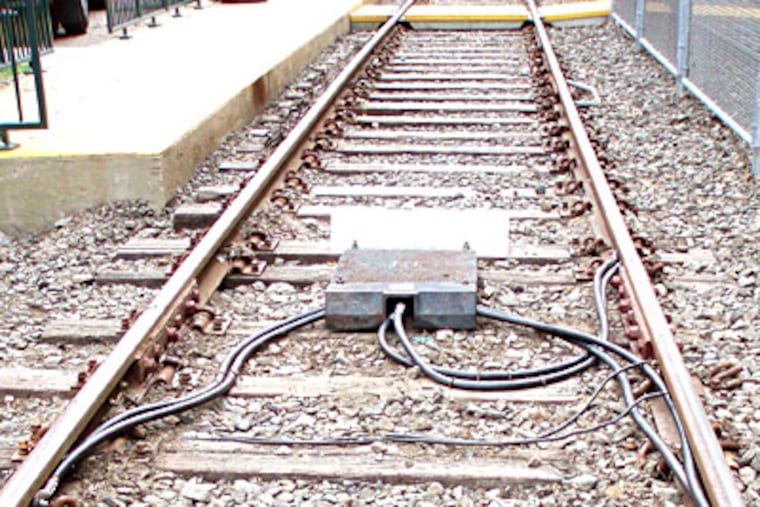Copper thieves stealing wires hampering service of local rail lines
Metal scavengers are hampering SEPTA rail and subway service by stealing the wires that power trains and operate signals. Attracted by rising copper prices, thieves are risking their lives to cut wires from overhead poles and between tracks, said Jeffrey Knueppel, SEPTA assistant general manager and chief engineer.

Metal scavengers are hampering SEPTA rail and subway service by stealing the wires that power trains and operate signals.
Attracted by rising copper prices, thieves are risking their lives to cut wires from overhead poles and between tracks, said Jeffrey Knueppel, SEPTA assistant general manager and chief engineer.
In addition to stranding trains, the thefts can imperil passengers. Cut wires can send rogue electric currents running through station hand rails, water pipes, or even the ground.
The SEPTA thefts are part of a much broader scavenging epidemic ravaging transit agencies, power utilities, residential properties, sculpture grounds, and abandoned buildings. With scrap dealers paying about $3.50 a pound for copper, thieves see a quick profit in any metal they can cart away.
Amtrak was hit in January by thieves who stole about 300 feet of wire at the intersection of the Northeast Corridor and the Atlantic City Line, delaying seven NJ Transit trains. NJT trains have suffered delays in three separate incidents since the beginning of the year because of metal thefts.
Suspected wire thieves were arrested last week near NJT's Plauderville station in Bergen County after allegedly breaking into a signal box and stealing copper wire.
"These are not victimless crimes," said NJT spokesman John Durso. "They disrupt the lives of our loyal customers and can place their safety at risk."
Camden has been hard-hit by metal thieves, who have stolen wires from more than 200 lampposts, plunging neighborhoods into darkness. Camden City Council this week is considering tougher requirements on scrap-metal dealers to try to deter the resale of stolen metal.
Peco Energy stamps its name on wires and metal equipment to try to discourage thefts, but the only thing that seems to slow the dangerous thievery is a falling copper market.
"The thefts do increase or decrease depending on the price of scrap metal," said Peco spokeswoman Liz Williamson.
SEPTA is spending about $500,000 a year to repair and replace equipment damaged by scavengers, and two or three trains a month are delayed by power interruptions or signal failures caused by cut wires, Knueppel said.
"It's very frustrating," he said. "Our commuters expect to have a nice ride in, and many mornings, the first trains of the day are delayed when they find those areas of stolen cabling.
"We think we're going to be able to provide good service and we can't."
SEPTA officials said that even if scavengers are arrested, many get off with light sentences because the dollar value of the stolen metal is relatively low. Recently, though, some prosecutors have charged scavengers with endangering the public, which carries stiffer penalties.
On Feb. 6, Mark Andrews, 40, of North Hills, Montgomery County, pleaded guilty to felony theft, felony criminal conspiracy, and recklessly endangering other people for leaving exposed live wires that could have electrocuted SEPTA employees or caused damage to trains and injuries to passengers.
Andrews was arrested by Springfield, Montgomery County, police on Sept. 29 after he was spotted cutting and stealing copper wire above SEPTA tracks between the North Hills and Oreland stations on the Lansdale/Doylestown line. In addition to damaging SEPTA equipment, that theft also forced a nearby Peco electrical substation to shut down temporarily.
Sentencing was deferred to March 12 to determine the amount of restitution that Andrews may be required to pay, but he could be facing up to seven years in state prison.
SEPTA's assistant general manager for public and government affairs Francis Kelly praised Montgomery County District Attorney Risa Vetri Ferman for pursuing felony charges in the case.
"She understands the serious nature of this issue, and we're grateful," said Kelly. "It's a safety issue and a taxpayer issue."
SEPTA is trying to protect its wiring by building shields or armoring exposed cables to make them harder to steal. In buildings where metal pipes have been stolen, SEPTA is replacing them with PVC plumbing.
Where it's feasible to replace copper wiring with less valuable wire, SEPTA is doing so, said Andrew Gillespie, SEPTA's chief engineering officer for power. In many cases, though, wires of different metals are incompatible with each other.
"It's a constant and unending effort," said Knueppel. "But we'd rather be spending our money on different things."